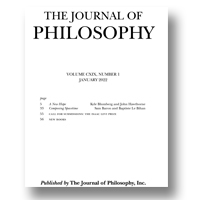|
1.
|
The Journal of Philosophy:
Volume >
111 >
Issue: 5
David Enoch
A Defense of Moral Deference
abstract |
view |
rights & permissions
| cited by
This paper has two aims – the first is to mount a defense of moral deference, and the second is to offer a (non-debunking) diagnosis of its suspiciousness. The paper defends moral deference by arguing that in the face of moral uncertainty, it is morally obligatory to minimize the risk of one's wrongdoing, and this moral requirement entails that deferring to a moral expert is sometimes not just morally permissible but also admirable, and indeed morally required. I explain the suspiciousness of moral deference by noting that the need to defer indicates a failure to respond to the right- or wrong-making features of the situation de re. The combination of this vindication of moral deference and diagnosis of its fishiness nicely accommodates some related phenomena, like the status of moral beliefs that are based on opaque evidence, and the fact that the scope of suspected deference includes also other normative domains.
|
|
|
2.
|
The Journal of Philosophy:
Volume >
111 >
Issue: 5
Shen-yi Liao, Tyler Doggett
The Imagination Box
abstract |
view |
rights & permissions
| cited by
Imaginative immersion refers to a phenomenon in which one loses oneself in make-believe. Susanna Schellenberg says that the best explanation of imaginative immersion involves a radical revision to cognitive architecture. Instead of there being an attitude of belief and a distinct attitude of imagination, there should only be one attitude that represents a continuum between belief and imagination. We argue otherwise. Although imaginative immersion is a crucial data point for theorizing about the imagination, positing a continuum between belief and imagination is neither necessary nor sufficient for explaining the phenomenon. In addition, arguing against Schellenberg’s account reveals important but underappreciated lessons for theorizing about the imagination and for interpreting boxological representations of the mind.
|
|
